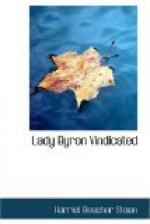’There was a lady at that time, double my own age, the mother of several children who were perfect angels, with whom I formed a liaison that continued without interruption for eight months. She told me she was never in love till she was thirty, and I thought myself so with her when she was forty. I never felt a stronger passion, which she returned with equal ardour . . . . . . .
’Strange as it may seem, she
gained, as all women do, an influence
over me so strong that I had great
difficulty in breaking with her.’
Unfortunately, these statements, though probably exaggerated, are, for substance, borne out in the history of the times. With every possible abatement for exaggeration in these statements, there remains still undoubted evidence from other sources that Lord Byron exercised a most peculiar and fatal power over the moral sense of the women with whom he was brought in relation; and that love for him, in many women, became a sort of insanity, depriving them of the just use of their faculties. All this makes his fatal history both possible and probable.
Even the article in ‘Blackwood,’ written in 1825 for the express purpose of vindicating his character, admits that his name had been coupled with those of three, four, or more women of rank, whom it speaks of as ‘licentious, unprincipled, characterless women.’
That such a course, in connection with alternate extremes of excess and abstinence in eating and drinking, and the immense draughts on the brain-power of rapid and brilliant composition, should have ended in that abnormal state in which cravings for unnatural vice give indications of approaching brain-disease, seems only too probable.
This symptom of exhausted vitality becomes often a frequent type in periods of very corrupt society. The dregs of the old Greek and Roman civilisation were foul with it; and the apostle speaks of the turning of the use of the natural into that which is against nature, as the last step in abandonment.
The very literature of such periods marks their want of physical and moral soundness. Having lost all sense of what is simple and natural and pure, the mind delights to dwell on horrible ideas, which give a shuddering sense of guilt and crime. All the writings of this fatal period of Lord Byron’s life are more or less intense histories of unrepentant guilt and remorse or of unnatural crime. A recent writer in ‘Temple Bar’ brings to light the fact, that ‘The Bride of Abydos,’ the first of the brilliant and rapid series of poems which began in the period immediately preceding his marriage, was, in its first composition, an intense story of love between a brother and sister in a Turkish harem; that Lord Byron declared, in a letter to Galt, that it was drawn from real life; that, in compliance with the prejudices of the age, he altered the relationship to that of cousins before publication.




